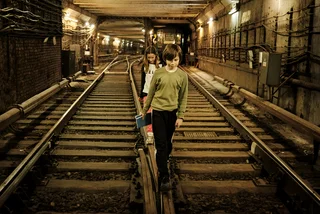Brigitte Bardot in a red cocktail dress and black wig announces the return of the French Film Festival, now in its 26th edition, running from Nov. 23–29. Many movies are coming to Prague, Brno, České Budějovice, Hradec Králové, and Ostrava, from this year’s Palme D’or winner in Cannes, the thriller Anatomy of a Fall, to Mr. Blake At Your Service, a comedy starring John Malkovich and Fanny Ardant.
The festival poster suggests a greater attraction than novelty: Jean-Luc Godard, the most famous French director, who directed Bardot in Contempt, the film that inspired the poster. This year, the festival is honoring Godard, who died last December, by showing five of his movies, all from the most fertile and most influential period of his career, the 1960s, the decade of the Nouvelle Vague. There’s also a sixth offering, Godard par Godard, an hour-long documentary directed by Florence Platarets from Godard’s archive material, shown this year in Cannes.
This is a unique opportunity for film lovers in Prague, five stories of passionate youth, with beautiful stars at the beginning of their careers and a young director bent on revolutionizing cinema, as well as using cinema to further the Revolution. Modernity is a youth movement—Godard is modernity par excellence, leading the young to rebel against society and sending them off in search of freedom.
I’ll say a few words about each of the movies, to introduce them and to show the artistic intention that brings them all together and makes Godard such an attractive figure again, because our times are as troubled as the ‘60s. Let’s recapitulate that decade through the lens of cinema, in a chronology that pays homage to Godard’s claim that history is cinema and cinema is history.
1960 – Breathless / A bout de souffle
The origin of the new wave of French cinema, Godard’s feature debut, the first of his scandalous successes. Breathless is an existentialist adventure that earned Godard a nomination for the Golden Bear and won him the Silver Bear at the Berlin Festival. Jean-Paul Belmondo (who died recently, in 2021) establishes himself as the great star of the decade in French cinema, a man in search of love, thwarted by a society that cannot tolerate freedom and hence makes criminals of ambitious youth. Accordingly, the film as a whole follows Belmondo in the doomed attempt to escape the police, to escape authority, and to run into Jean Seberg’s arms, if only she can understand his passion. The camera itself becomes his accomplice, taking a new energy and brashness from his attitude, and trying to transmit it to the audience.
1963 – Contempt / Le mépris
A second story of doomed love, this time focusing on an ambitious young artist played by Michel Piccoli, a playwright turning scriptwriter in the glamorous international post-war European situation. He’s French, but he’s recruited by an American producer to work in Rome, on a German director’s—the great Fritz Lang, playing himself—adaptation of Homer’s story of mankind after a great war, the Odyssey. The playwright’s wife, Bardot, follows him to Rome and then to the luxury of Capri, only to become contemptuous of his servility to the film industry, leading, as is typical for Godard movies, to catastrophe.
1965 – Pierrot le fou
A third love story, which earned Godard a Golden Lion nomination in Venice, again starring Belmondo. This time, he’s a typical creature of the French 19th-century novel, taken from Stendhal or Balzac, a poetic type who compromises himself by marrying into a rich bourgeois family. In a fit of madness, in search of freedom, Belmondo flees alongside a girlfriend (Anna Karina, Godard’s wife and muse during this period, she has also died recently, in 2019) who turns out to be involved in very dangerous affairs. She nicknames him Pierrot, the sad clown of the commedia dell’arte. If the action in Breathless is about going to Paris, Pierrot Le Fou is about escaping Paris and going South—like the Impressionist painters—to the skies of the Provence, to the French Riviera… The film is overwhelmed by the colors of the French flag and involves political intrigue, in the form of rightwing terrorism; the madness of the times proves to be as dangerous to young lovers as bourgeois conformism. Pierrot Le Fou earned Godard a Golden Lion nomination in Venice.
Alphaville
Alphaville came out the same year and is a rare Godard fable, or a science fiction story, and, stranger still, a happy love story. The film shows the post-WWII war as tyrannized by technology, computers, and collectivism, fundamentally inimical to individualism and love. Alphaville is a city that epitomizes this inhumanity. It is the creation of a Dr. Von Braun (referencing the scientist who helped the Nazis build rockets, Wernher von Braun), but it is run by a computer, Alpha60. An American noir protagonist, Lemmy Caution (Eddie Constantine), plays the spy tasked with liberating the people of Alphaville from mental slavery, starting of course with the lovely Natacha von Braun (Anna Karina). Alphaville won Godard the Golden Bear in Berlin.
1967 – The Chinese woman / La chinoise
Finally, love is replaced by the revolution, as five young people form a Maoist cell in their bourgeois world in Paris, intending to commit political violence. Two of them form a beautiful couple, Veronique (Anne Wiazemsky, Godard’s wife after Karina divorced him) and Guillaume (Jean-Pierre Léaud, François Truffaut’s favorite actor). But they are torn apart by the political passions of the times, which among other things involve liberation for women, a great theme of Godard’s stories in that decade. La Chinoise largely plays as a parody of Dostoevsky’s Demons, the novel that inspired the story, but it’s also a warning about the coming violence of May 1968. Breathless was Godard’s first feature—seven years later, La Chinoise was his 17th, and it earned him another nomination to the Golden Lion and won him the Special Jury Prize in Venice. He had gone from unknown to the most famous director in Europe.
This year's French Film Festival (Nov. 23–29) presents 47 films over 144 screenings. Thirteen headliners that recently screened at top festivals like Cannes, Venice, and Toronto will get Prague premieres. The tribute to New Wave icon Jean-Luc Godard will close out the Prague portion of the event. In Prague, films will be screened at Kino 35, Lucerna, Světozor, and Edison Filmhub. Check the festival's website for the full program and English-subtitled options.












 Reading time: 5 minutes
Reading time: 5 minutes 






















